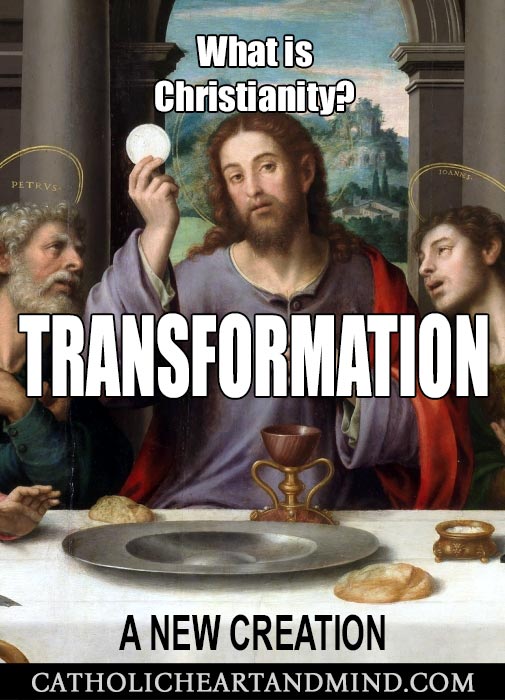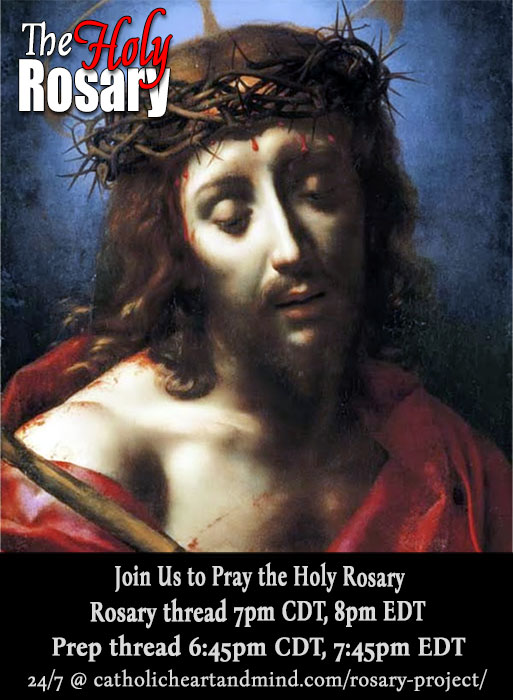+JMJ+ (Our loosely themed Catholicism 101 or What is Christinity series continues.) A Christian anthropology: what would that mean? Christianity does have a certain way of looking at man, at God, at the world, at reality. It is more than a way of looking but, yes, it is a way of looking. It’s a way of describing what reality is. And it is more than describing it. We describe it to think about it and to tell others about it, but we also describe it so we can do something with it or about it in an interior and an exterior way.
Interiorly we pray and talk with the Lord, and we practice mortification, which we also practice exteriorly. Our Christian life depends on this dual practice, interior and exterior, or it runs the risk of becoming a figment of our imagination, of drying up and withering away. It needs a foundation, a root that is real, to ground it and to feed it, so that our Christianity is grounded and fed, remaining real and living.
And what is this foundation, this root? It must be the Gospel and by this I do not mean primarily the book known as the Bible but the Gospel which is recorded in the Bible but cannot be contained in it, because the Gospel is Living and Christ is Living and He cannot be contained in a book, not even the Good Book, though of course it does contain the story of His Life and contains His Words, though even the Bible says it does not contain all of what He did (and surely not all that He said, either).
This is that disciple who giveth testimony of these things, and hath written these things; and we know that his testimony is true.
But there are also many other things which Jesus did; which, if they were written every one, the world itself, I think, would not be able to contain the books that should be written.
John 21: 24-25, Douay-Rheims Bible, public domain.
Where do we find this Gospel? As I said, it is not primarily the Bible, though it is recorded there and we do hold the Bible in very high regard as the word recording the Word for us and inspired by God. But I’m talking about the Gospel that is the Good News that is Jesus Himself. The New Covenant was not a book when it began, it was Jesus. “This is My Body, this is My Blood, the blood of the new and everlasting covenant…”
For this is my blood of the new testament, which shall be shed for many unto remission of sins.
Matthew 26:28, Douay-Rheims Bible, public domain.
The word “testament” (diatheke in Greek, berith in Hebrew, diatheke nea in Hebrews) is often (and better) translated as “covenant” and Jesus was the New Testament or New Covenant long before the book came to be known by that title. In the Bible we see Jesus and the Apostles quote Scripture but that is the Old Testament they are quoting. And they call it Scriptures, graphai. (This paragraph is based on Consuming the Word, chapter 2: Before the Book. See note below).
So Christ is going to feed us, His disciples, in His Word, and in the sacrament of His Body and Blood, Soul and Divinity. We receive grace in the sacraments. We receive grace in other ways, in prayer, too, but primarily we receive saramental grace in the sacraments.
We are Christians and we have been baptized and have taken an oath. We are bound to not just accept some ideas and concepts and say with our lips that we believe them, but we have bound ourselves with an oath and we have taken upon ourselves His yoke so that He may form us and mold us and make our hearts like unto His.
Jesus, meek and humble of heart, make my heart like unto Thine.
And He wants to form our minds and hearts and wills, all three, which is where our dual practice of interior and exterior acts comes in. This is what we’re about, this is what we are doing and what is being done to us. We can’t do it all, we can’t do any of it unless the Lord does it. But He won’t do it without us. We are co-workers in the vineyard. We must co-operate. It would be foolish to say to God, “Okay, change me. I double dawg dare ya.” Why would He? He has given us free will, why would He then turn around and force us to change? Answer: He wouldn’t and He doesn’t.
Three reasons God commands us to pray correspond to our three deepest needs, the fundamental needs of the three powers of our soul: prayer gives truth to our mind, goodness to our will, and beauty to our heart.
Prayer for Beginners, by Kreeft, Peter, ch. 2., ebook.
So we take up our cross and our dual practice of inner and outer discipleship, our practice of prayer, our interior and exterior practices of mortification, and we allow Christ to feed us His grace in the sacraments, and we follow Him, one footstep at a time. Just one more day, just one more step. Until we reach the end of all our journeying and find we are totally transformed, a new creation.
1 And I saw a new heaven and a new earth. For the first heaven and the first earth was gone, and the sea is now no more.
2 And I John saw the holy city, the new Jerusalem, coming down out of heaven from God, prepared as a bride adorned for her husband.
3 And I heard a great voice from the throne, saying: Behold the tabernacle of God with men, and he will dwell with them. And they shall be his people; and God himself with them shall be their God.
4 And God shall wipe away all tears from their eyes: and death shall be no more, nor mourning, nor crying, nor sorrow shall be any more, for the former things are passed away.
Rev 21:1-4, Douay-Rheims Bible, public domain.
Thank you for visiting and reading. Feel free to comment or leave feedback. May this be the year we begin to practice our faith more deeply than ever, interiorly and exteriorly, carrying our cross as we follow Him, and may we become the saints He means us to be. God bless you, every one, and may His peace be always with you. +JMJ+
Join me on Fridays for the Rosary Project Live on Twitter at 8pm ET, 7pm CT, to cultivate a culture of Light, Life, Love, Truth, Beauty, and Goodness, for the conversion of sinners, and for the salvation of souls. There’s also a Rosary on the blog you can use anytime.
“The Rosary is the ‘weapon’ for these times.” — Padre Pio
Notes and Links
- Consuming the Word, by Scott Hahn: Hardcover, Kindle, Audible audio book (Amazon affiliate links, see Full Disclosure below).
- This beautiful prayer about the meekness of Jesus’s heart is so old and so common, I don’t know where it comes from. I do have books about the devotion to the Sacred Heart of Jesus. If I find anything about the source of the prayer, I’ll write about it here on the blog one day.
- Prayer for Beginners, by Peter Kreeft: Paperback, Kindle, Audible audio book (Amazon affiliate links, see Full Disclosure below).
Image: In the banner, Última Cena, by Juan de Juanes, via Wikimedia Commons, public domain. The Last Supper, by Frans Pourbus (II), via Wikimedia Commons, public domain, lettering added. Sacred Heart of Jesus, carrying His cross, artist unidentified. St. John the Evangelist’s Vision of Jerusalem, by Alanso Cano, via Wikimedia Commons, public domain.
Subscribe via email: While you’re here, subscribe to get new blog posts, updates on projects like the ebooks, giveaways, and who knows what else. And thank you very much!
Full disclosure: When you make any purchase through my Amazon affiliate links (or my general Amazon link) on this site, I may make a small commission at no cost to you. Thank you. And thank you for your prayers and support.
Copyright: All original material on Catholic Heart and Mind is Copyright © 2009-2024 Lee Lancaster. All rights reserved. Read more.
Series Navigation
Annotated Table of Contents Catholic Christianity 101 Series
Annotated Table of Contents for all series.





